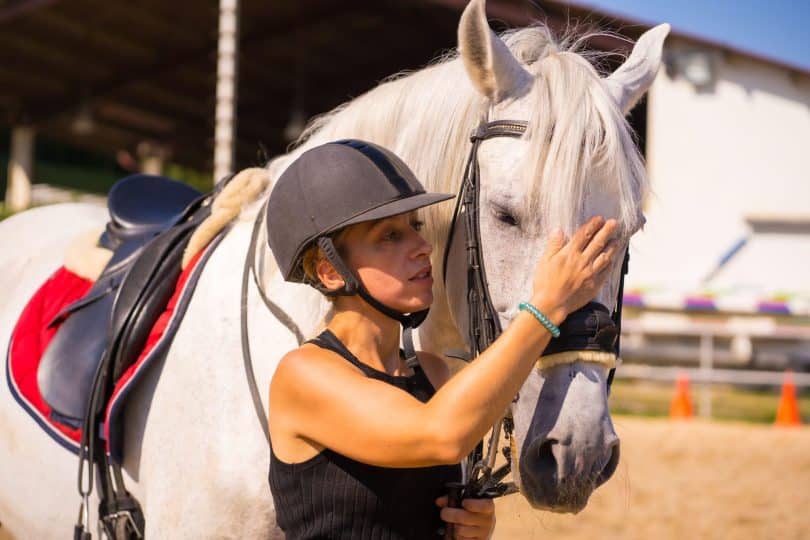Attention all horse racing enthusiasts! Are you prepared to launch on the thrilling journey of owning your racehorse? From the complicated world of bloodlines and breeding to comprehending financial responsibilities, Charles Mady will guide you through the process. Get ready to fulfill your dream of horse ownership.
Contents
What is a racehorse?
A racehorse is a specially bred horse that partakes in organized horse racing events. These horses experience relentless training to develop quickness, constancy, and skillfulness. They are typically thoroughbred horses known for their athleticism and speed. Race horses are carefully chosen based on their lineage, conformation, and prospect for performance. They experience extensive training and conditioning to qualify for different races, ranging from short sprints to longer lengths. During races, they compete against other racehorses, intending to be the first to cross the finish line.
What Breeds Are Commonly Used for Racing?
Thoroughbreds and Standardbreds are the most generally used breeds for racing. They are famous for their quickness and skillfulness, making them prevalent in horse racing. They are trendy for flat racing, including prestigious events like the Kentucky Derby.
Standardbreds, on the other hand, are primarily utilized for harness racing. They excel in races where they pull a two-wheeled cart called a sulky. Both breeds have been selectively bred and prepared for racing, resulting in their outstanding performance on the track.
What are the Different Types of Races?
There are various horse races, each with its characteristics and requirements. Some common types include:
- Thoroughbred Races: These races are particularly for horses of the Thoroughbred breed. Understood for their swiftness, they are the most famous type of horse racing.
- Harness Races: These races involve horses pulling a two-wheeled cart called a sulky, with the jockey sitting in the sulky instead of riding directly on the horse.
- Quarter Horse Races: These races are exclusively for Quarter Horses, a breed known for their ability to sprint short distances.
- Steeplechase Races: In these races, horses must jump over obstacles such as fences and water jumps, testing both speed and jumping ability.
- Endurance Races: These races challenge a horse’s stamina and ability to cover long distances. The winner is the horse that completes the course in the shortest time.
How to Choose a Race Horse to Purchase
Choosing a racehorse to purchase involves several important considerations. The following are a few efforts to direct you in the procedure:
- Define your goals: Decide what you expect to earn with the racehorse, such as races or breeding.
- Research bloodlines: Study the pedigree of potential horses and analyze their performance records.
- Assess conformation: Evaluate the horse’s physical structure, looking for soundness, balance, and athleticism.
- Observe temperament: Spend time with the horse to assess its behavior, disposition, and willingness to work.
- Consult experts: Seek advice from veterinarians, trainers, and experienced horse owners to gain valuable insights.
- Set a budget: Determine your financial limitations in ongoing expenses like training, veterinary care, and boarding.
- Arrange a vet check: Prioritize a thorough pre-purchase veterinary examination to identify potential health issues.
- Attend inspections and auctions: Participate in horse sales events to view and assess horses up for sale.
- Trust your instincts: Choose a racehorse that aligns with your goals and connects with you.
What Factors Should Be Considered?
When choosing a racehorse to purchase, several factors should be considered to ensure a successful investment:
- Pedigree: Evaluate the horse’s bloodline, including the sire and dam’s racing performance and genetic potential.
- Conformation: Assess the horse’s physical structure, looking for balance, strength, and the absence of any significant conformational faults.
- Performance: Review the horse’s racing record, paying attention to consistency, speed, and competitiveness.
- Health and Soundness: Conduct a thorough veterinary examination to identify any existing or potential health issues.
- Temperament and Trainability: Consider the horse’s temperament and willingness to work with trainers and jockeys.
What is the Average Cost of a Race Horse?
The average cost of a racehorse can differ significantly depending on different factors, including the horse’s pedigree, age, training, and possibility for success on the racetrack. A racehorse can be bought for about $5,000 to $10,000 on the lower end. However, top-quality, well-bred racehorses with a proven track history can command hundreds or even millions of dollars.
In addition, continuing costs such as training fees, veterinary maintenance, and race entry fees should be evaluated when budgeting. It is vital for owners to carefully consider their budget and financial aid before investing in a racehorse.
The Process of Purchasing a Race Horse
Researching and Identifying Potential Horses
Researching and identifying potential racehorses is crucial in racehorse ownership. Here is a step-by-step guide to help you in this process:
- Research Different Breeds: Know about other breeds generally utilized in racing, such as Thoroughbreds, Arabians, or Quarter Horses.
- Study Pedigree: Look into the bloodlines and performance history of potential horses to assess their racing potential.
- Attend Races and Auctions: Visit race tracks, auctions, and sales to observe horses in action and interact with sellers.
- Consult with Experts: Seek advice from trainersand experienced owners to gather insights and recommendations.
- Conduct Physical Evaluations: Inspect potential horses’ movement and overall health to identify potential issues or strengths.
- Review Performance Records: Analyze race records, including past performances and times, to gauge a horse’s competitiveness.
- Consider Budget: Assess the cost of purchasing and maintaining the horse, including vet bills, training fees, and insurance.
Evaluating the Horse’s Performance and Health
When evaluating the performance and health of a racehorse, it is vital to evaluate different elements to make a knowledgeable decision.
- Review the horse’s race records and statistics, taking note of wins, placements, and times.
- Consider the horse’s gait and movement, peeking for fluidity, balance, and coordination.
- Consider the horse’s pedigree and bloodline, which can provide valuable insight into potential genetic strengths and weaknesses.
- Seek veterinary evaluations, including medical examinations, x-rays, and bloodwork, to identify underlying health issues.
- Observe the horse during training sessions, taking note of their attitude, work ethic, and responsiveness to commands.
Negotiating the Purchase Price
When negotiating the purchase price of a racehorse, follow these steps:
- Research comparable horse prices to establish a baseline.
- Evaluate the horse’s performance, health, and potential for improvement.
- Consider the horse’s bloodline, age, and racing history.
- Assess any training or veterinary issues that may affect the horse’s value.
- Engage in open and honest communication with the seller regarding your budget.
- Be prepared to negotiate and make counter-offers.
- Seek professional advice from trainers or agents.
- Ensure all agreements are documented in a written contract.
Completing the Purchase and Transfer of Ownership
Completing the purchase and transfer of ownership of a racehorse involves several essential steps:
- Finalize the purchase agreement, including price, payment terms, and conditions.
- Arrange for a pre-purchase veterinary examination to ensure the horse’s health and soundness.
- Obtain necessary paperwork, such as a bill of sale and registration transfer forms.
- Submit the paperwork to the appropriate racing authorities for transfer of ownership.
- Pay any necessary fees for registration and transfer.
Costs and Responsibilities of Race Horse Ownership
Owning a racehorse comes with a combination of costs and commitments. There are some unique concerns to keep in mind:
- Initial purchase cost: A racehorse can cost thousands to millions of dollars.
- Training and boarding expenses: Monthly fees for trainers, jockeys, and stable management can quickly add up.
- Veterinary care: Regular check-ups, vaccinations, and emergency medical treatments are essential for the well-being of your horse.
- Insurance: It is crucial to protect your investment with comprehensive coverage.
- Race entry fees and travel expenses: Participating in races involves entry fees and transporting the horse.
- Retirement planning: Planning the horse’s future after its racing career ends is an important responsibility.
What are the Ongoing Expenses?
Ongoing expenses for racehorse ownership can vary depending on various factors, but some standard costs include:
- Training fees: Covering the horse’s daily care, exercise, and training.
- Veterinary care: Regular check-ups, vaccinations, dental care, and emergency medical expenses.
- Farrier services: Regular hoof care and shoeing.
- Stabling: Renting stalls or pastures for the horse’s living space.
- Transportation: Moving the horse to different racing venues.
- Entry fees: Payments to enter races.
- Insurance: Protecting the horse against accidents, illnesses, and injuries.
What are the Responsibilities of an Owner?
Racehorse owners have several essential responsibilities. Firstly, they are responsible for providing proper care and maintenance for their horse, ensuring a suitable living environment, nutritious food, and regular exercise. Additionally, owners must arrange for veterinary care to monitor the horse’s health and address injuries or illnesses. They also hire and oversee a skilled training team to prepare the horse for races.
In addition, owners must fulfill financial obligations, covering expenses such as entry fees, jockey fees, and insurance. Lastly, owners should actively participate in decision-making regarding the horse’s career, including selecting races and considering breeding opportunities.







